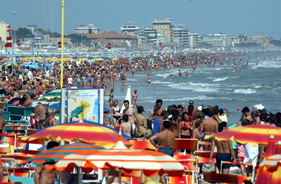Why is Italy’s Romagna important?

The tourists came and went but they missed the best bit
Long, long ago in the 1960’s as a young travel agent I went on a FAM trip to Italy. In those days of ‘La Dolce Vita’ I was lucky enough to be invited to the party capital of Europe. Forget Ibiza, I was going to THE top beach and party destination – distinctively Italian glitzy Rimini.
It was wild. Here was the place that the cool North and the warm South met. Nordic blondes of all sexes mingled with lusty warm Italians on beach paradise – Rimini. Then the biggest lido in the world Rimini had everything for a wild holiday including over 150,000 beds, thousands of nightclubs and discos, restaurants and bars. It was success in tourism personified and it was ram-packed full of party-going people.
Rimini airport was a great success and every European tour operator from Thomson to Dr Tigges vied to get good landing and take off slots
Then of course, as is the way with fashionable tourism – it all disappeared. Gradually this destination slid. The empty facilities and the airport were filled up with visitors from the newly-liberated Soviet Union countries. Menus and signs appeared in Russian. Then they went too. Now the airport is practically closed.
That’s how mass beach and sea tourism works. Now it’s here then it’s not. It is, of course fashionable to be somewhere new every year.
I must have been to Rimini over a hundred times before I realized that it had something much better to offer than just mass tourism, beaches and glorious seafood (I guess that’s what kept calling me back).
The fact is that Rimini and Romagna (the ancient region created by the Roman Empire to provide land for returning soldiers) – have possibly the destination best suited to sustainable tourism in the world. It’s certainly the best I have ever seen – when I FINALLY began to explore it!
What does that mean?
Firstly it has no equal in great local food and wine. Those Roman soldiers used their allotments to feed their families from land that was watered by the mighty Po and half a dozen other rivers. By the 1970’s little Romagna was nearly the equal of California in the production of soft fruit – apricots, nectarines, cherries, apples, kiwi, persimmons and more. And great vegetables and great meat, and extraordinary wines and superb olives. Plus there are literally world-beating small, beautiful organic, biodynamic vineyards.
Secondly the food culture is in Romagna peoples DNA. So you’ll find it almost impossible to get a bad meal OR pasta that has not been made the morning you eat it.
Thirdly the tourism authorities can be forgiven when they thought that they had a success in Rimini and found cities of art elsewhere in Italy. So now the glorious art cities of Cesena, Forli, Faenza and Ravenna – not to forget Rimini’s massive roman city – have had nowhere near the exposure of Parma and Modena. So Romagna has an unrivalled but undiscovered art treasury.
Fourthly, for some reason Romagna’s history has never reached the levels of exposure of Venice’s or Tuscany’s. Yet, excepting Rome it is possibly Italy’s most history-full area. After all Ravenna was the capital of the Roman empire when Rome fell and was closely linked with the other half of the empire in Byzantium and was capital of the Gothic Empire – and that’s just a tiny part of Romagna’s world-class history.
Fifthly Romagna’s environment is stunning – castle and cathedral-topped hills and mountains serene valleys, pilgrimage trails, an astonishing coastal plain.
Sixthly there is no people more hospitable than the Romagnoli – they are always willing to share the name of a good restaurant or a special dish, to share the names and works of their fine artists from Fellini to his revered co-operator Tonino Guerra, poet, artist, mosaicist, party-giver, restauranteur. And to share a bottle of local wine!
Seventhly – sustainability is a journey and the whole region is definitely on it. Local, fresh, seasonal is de rigeur, everybody is involved in an initiative of one sort or the other
And finally Romagna is still THE party place. Everything is a festa, everywhere – all local produce is revered in the village that it’s grown – cherries, peas, cakes, potatoes, plums, apricots – everything. Every weekend there is a party of gratitude for food or wine in some pretty village.
If sustainability is mainly a deep awareness of the beautiful world around us then Romagna is its green cathedral.
Maybe Romagna is the next step for tourism, gentler, more fulfilling, truly engaged forms of tourism that will really foster harmony, understanding and sanity – with benefits for all.
Valere Tjolle
Valere’s Romagna initiative is Best of Romagna
Valere
Have your say Cancel reply
Subscribe/Login to Travel Mole Newsletter
Travel Mole Newsletter is a subscriber only travel trade news publication. If you are receiving this message, simply enter your email address to sign in or register if you are not. In order to display the B2B travel content that meets your business needs, we need to know who are and what are your business needs. ITR is free to our subscribers.












































TAP Air Portugal to operate 29 flights due to strike on December 11
Qatar Airways offers flexible payment options for European travellers
Airbnb eyes a loyalty program but details remain under wraps
Air Mauritius reduces frequencies to Europe and Asia for the holiday season
Major rail disruptions around and in Berlin until early 2026